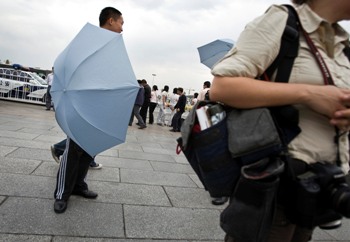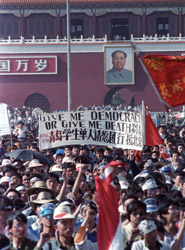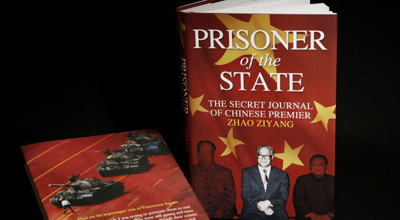Looking at Tiananmen as a ‘development opportunity’
The English-language version of the state newspaper Global Times raised eyebrows on Tuesday with an article headlined, “Evolution of Chinese intellectuals’ thought over two decades.” The opinion piece included a quote from an academic referencing the “June 4 incident”–a departure for domestic, state-run media, which never refer explicitly to the peaceful demonstrations that were crushed…

Tiananmen: It’s raining censorship
It’s hot in Beijing this time of year. An umbrella can serve as a convenient protection from the sun. Back in the spring of 1989, hundreds of umbrellas filled Tiananmen Square like makeshift shelters–until the army deployed tanks and guns against the anti-government protesters holding them.
Foreign journalists harassed in Tiananmen Square
The Foreign Correspondent’s Club of China (FCCC) has posted a statement on its Web site about Chinese security officials–uniformed and otherwise–harassing foreign journalists in and around Tiananmen Square. The group’s incident list includes five cases of obstruction reported in the past week. As usual in situations the government finds sensitive, police are not following regulations…
China blocks Twitter before Tiananmen
“Twitter is a new thing in China. The censors need time to figure out what it is. So enjoy the last happy days of twittering before the fate of YouTube descends on it one day,” veteran Chinese blogger Michael Anti told the media blog Danwei in a May 27 interview.

Tiananmen briefing: Gate to press freedom closed in 1989
The events of 1989, which culminated on June 3 and 4 when the army opened fire on civilians trying to block its approach to the main site of protests at Tiananmen, the “gate of heavenly peace,” are dismissed as riots in official state media accounts. Propaganda officials interpret references to the events as a sign…
Euna Lee, Laura Ling families to speak out
With a June 4 criminal trial date looming for what North Korea calls “hostile acts,” the families of Euna Lee and Laura Ling have decided to speak out about the two journalists’ detention in Pyongyang. The two women have been held since March 17. In a Facebook announcement, the families told supporters: “Our families have…

No news on Zhao is good news for Communist Party
News of the coming posthumous publication of Zhаο Ziyаng’s memoirs hit the stands this week–outside China, anyway. Local media did not cover the story on Friday, and officials have yet to comment. Neither the Chinese nor the English version of the book, Prisoner of the State, reportedly transcribed while the former Communist Party general secretary was under house…
One year after Sichuan, six after SARS, 33 after Tangshan
One of our news alerts on Monday detailed the harassment reporters faced as they tried to cover the anniversary of the Sichuan earthquake, one of China’s greatest natural disasters. Today, on the anniversary, newspapers marked the event with strong coverage. That’s a world of difference from the years of coverage that obscured the breadth of…
Schiff, Pence speak out for press freedom
“Information is power, which is precisely why many governments attempt to control the press to suppress opposition and preempt dissent,” said U.S. Rep. Adam Schiff, the California Democrat who three years ago founded the Congressional Caucus for Freedom of the Press. “Far too often, the reporters and editors who demand reform, accountability, and transparency find…
World leaders note Sri Lankan press abuses
Sri Lanka got special mention in the statements of world leaders marking World Press Freedom Day, May 3. It’s not surprising. The government in Colombo has coupled an all-out effort to end its war with the separatist Liberation Tigers of Tamil Eelam with an assault on critics in the Sri Lankan media. U.S. President Barack…